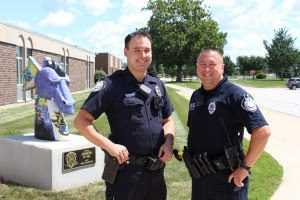Declining Number in Office Referrals Leads to an Improved School Climate
Story by Rylee Robinson
The Johnston Community School District has partnered with the Johnston Police Department to provide the School Resource Officer (SRO) program since the 2007-08 school year. The SRO program provides students with positive law enforcement interactions and builds trusting relationships between the district and city.
Starting in the 2014-15 school year, the SRO program expanded from one officer to two; one designated to all five elementary schools and Summit Middle School, the other assigned to Johnston High School and Johnston Middle School.
City of Johnston Police Chief Dennis McDaniel stated that between the three secondary schools – Summit, JMS, and JHS – an average of 48.25 police reports/referrals were generated each semester during the 2014-15 and 2015-16 school year. Data available for the first semester of the 2016-17 school year shows the number of referrals down to just 15.
While the downsized number is good for office referrals, SROs have seen an uptick in the number of secondary students seeking and/or receiving counseling and mentoring referrals. In 2014-15, 1,156 students were referred; in 2015-16, 2,029 students; and for the first semester in 2016-17, 1,896 students benefited from having the SROs’ referral.
According to Officer Zach Grandon – the SRO assigned to grades K-7 – the program originally focused on applying consequences to negative behavior and less on community. Grandon said recent strides have been made in developing a more community-focused approach, allowing relationships to be made with students at an early age.
“Students in the school district are able to build trust with SROs as early as elementary school when they go through the 411 program,” said Grandon. “That familiarity and trust becomes valuable when officers may have to have uncomfortable or legal conversations with those students as they move through their educational experience.”
While the program focuses on communication between officers and students, several factors contributed to this year’s decline in referrals.
“Overall I think it’s a team effort and I don’t think the progress that has been made could have been done by one entity itself,” said SRO Zach Grandon. “The schools have been very good about having communication with law enforcement, which allows many of the smaller issues to be dealt with before they become more serious.”
The change in student behavior provides new opportunities for the officers. Students are able to encounter new challenges in positive ways by turning to counseling or mentoring through the guidance of the SRO.
“In large part, the issues that kids deal with today are the same as their parents’ issues in school (i.e. fights, drinking, drugs, harassment),” said Grandon. “In addition, kids also have to be wary of a whole new series of issues regarding the Internet, sexting, and social media. I think the schools and law enforcement have made a concerted joint effort to address this constantly changing landscape.”
The positive relationships between Johnston students and SROs make for a secure and positive environment – one the district and city plan to continue.
